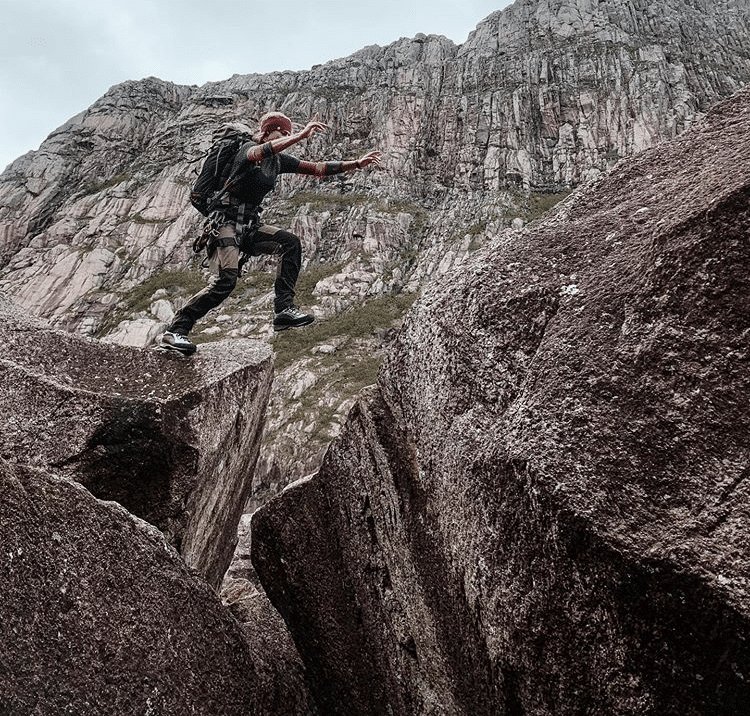The stress response – meeting the animal inside you
Megan Hine
In the first of a two-part column Megan looks at the science behind stress, and how our ancestral responses to threat are constantly triggered by modern life.
Hurtling along the track, you feel at the mercy of life’s roller coaster. Somewhere along the way you forgot how you stumbled onto this ride, your attention taken up with the realisation that in the blind enthusiasm of youth, you forgot to put on your safety belt. Desperately hanging on by your fingertips as life throws you mercilessly around. You want to slow down or get off but you have no idea how.
Does this sound familiar?
You may have noticed on social media the getoutside hashtag bouncing around. What if I told you that underneath the dazzling array of perfect pictures, which sometimes make you feel your life is not exciting enough, is actually a message worth paying attention to? That spending time surrounded by or immersed in nature once a day or several times a week will help you take control of that rollercoaster, promoting you from passenger to driver. This is the first in a two-part article which will look into the science behind stress, setting the scene for the second part which will take you on a journey to meet your ancestors and show why nature is good for us.
Over my career I have guided, instructed and looked after hundreds of people in the wilderness; from the hills of the United Kingdom to jungles of the Amazon, to the soaring heights of the Himalaya.
Right from the start I noticed there was something incredibly therapeutic in spending time outside – after all it had captured and calmed my own restless nature. Over the years I saw increasing numbers of clients, both adults and children, writing on their medical forms that they had been diagnosed with stress and anxiety related issues. Initially I wondered whether this was due to doctors more freely diagnosing this or if there genuinely was a rise in stress and anxiety. In our modern world where we have everything we need on tap – access to benefits, to free health care (in the UK), to clean water – why then should we be worrying or feel overwhelmed and stressed? But it is not just a passing wave, we genuinely are becoming more stressed and overwhelmed.
To answer this, let’s take a look at the science behind stress. This is a mini science lesson but please bear with me. I promise it will give you an understanding to realise that you are not ungrateful or weak but actually experiencing a perfectly natural response, hard wired into humans and all animals.
Let’s imagine you’re about to cross the road. As you step out onto the tarmac, you leap back just as a car hurtles past. Your body seemingly moved itself out of harm’s way. You are left feeling shaky, breathless, slightly sweaty with a racing heart, we’ve all been there.
R.E.W.I.N.D….. Let’s break it down.
As you go to cross the road you look right and left, your eyes looking for traffic, your ears listening for the sound of an engine. The eyes and ears send a message to the amygdala, a tiny part of the brain used for emotional processing. The amygdala deems it safe to cross and you go to step out, looking back to the right as you move your foot out. Then your eyes and ears send a new set of images and sounds to the amygdala that there is danger! A car is now coming towards you. The amygdala sends its danger alert to the Hypothalamus, the command centre of the brain, which then sends a message to the body through the autonomic nervous system.
The autonomic nervous system is made up of two systems, the parasympathetic nervous system, the relaxer, and the sympathetic nervous system, responsible for preparing the body for intense physical activity, more often known as the ‘fight or flight reflex’. The fight/flight reaction triggers the adrenal glands to release adrenalin (epinephrine) into the blood stream making the heart beat faster, sending blood to muscles, and raises the pulse rate and pressure, and opens small airways in the lungs allowing them to take in more oxygen with each breath. More oxygen is sent to the brain heightening the senses. Adrenalin also triggers the release of blood sugar and fats from temporary storage within the body into the blood stream, sending an energy supply to all parts of the body. At this stage the body steps backwards, out of the path of the speeding car, taking the body to safety. The effects are still felt, hence the breathlessness, the racing heart and the shakiness.
All this happens faster than we can consciously be aware of and the car can have passed before we realise what has just happened.
In this situation, the eyes look right and left again and now see no danger and you cross the road safely and carry on your day. The amygdala and hypothalamus, happy there is no imminent danger calls the parasympathetic nervous system into play, relaxing the systems and recovering. If the danger was not over, the secondary component of the stress response kicks in causing the hypothalamus to release corticotrophin releasing hormones (CRH) which travels to the pituitary gland, triggering the release of adrenocorticotropic hormone (ACTH). This hormone travels to the adrenal glands, prompting them to release cortisol. This means the body stays wired and on high alert. When the threat passes, cortisol levels fall.
This is where this astounding system hits a slight glitch and where the science above becomes relevant if you are feeling stressed and overwhelmed. I think you’ll agree that this is an incredible survival mechanism, designed to help keep animals and our ancestors alive. The fight or flight reaction provided us the means to react with super hero speed to danger, and not so dangerous things: have you ever caught a falling bottle of beer or wine?
However, the senses cannot distinguish between a real or a perceived threat. Have you ever looked at your friend’s Facebook or Instagram with the perfect photos of their life which is ‘so much better than yours’ and felt your heart start racing, or felt slightly breathless? Or before a board meeting or presentation? Or running late to meet a friend or colleague or pick up your children? Yup, you got it. Fight or flight cannot differentiate between the almost definite pain (or death) of being hit by a car versus the ‘perfect’ pictures.
We know the pictures are only a snapshot of someone’s life, not the full picture, we know it is not life or death if we are late for a meeting, but the system beneath cannot tell the difference and it is reacting faster than we can consciously think. For our ancestors, this response would have been short lived to protect them from harm. In the modern world, we are surrounded by so many perceived threats that our system is constantly on overdrive and is constantly wired. Like any engine or energy system, this will become overloaded or run out of energy at some point and is not sustainable. So how can we combat this?
In the next article we will take a journey to visit our ancestors and explore why nature may hold the key to unlocking this puzzle….

Join The Book of Man
Sign up to our daily newsletters to join the frontline of the revolution in masculinity.



















